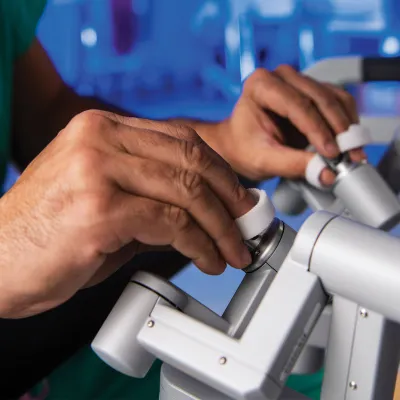
DHI’s Colorectal Surgeons Can Perform Rectal Procedures That Preserve Normal Function
The Digestive Health Institute wants their patients to receive effective treatments that are the least disruptive to normal life. That is why they strive to offer sphincter-sparing surgery for patients who need to have part of their rectum removed as treatment for rectal cancer, fecal incontinence or ulcerative colitis. Sphincter preserving procedures allow patients to be able to void naturally, preserving quality of life.
The external sphincter is the muscle that surrounds the anus. You can control this muscle so that waste is eliminated when you want it to be. Without the sphincter, stool would come out involuntarily and patients would need a colostomy, where the end of their colon empties into a bag attached to their abdomen. Sphincter-preserving surgery, which has been greatly improved in recent years, means that patients can avoid having a permanent colostomy. Also, sphincter-sparing surgery makes it more likely that the reproductive and urinary systems will continue to work as usual.
DHI Offers the Most Advanced Sphincter-Sparing Options Including:
- Standard low anterior resection (LAR) – The most basic sphincter-sparing surgery is the one used to treat diseased tissue in the upper portion of the rectum. The problem tissue is removed completely, and enough of the rectum remains for the sphincter to not be affected by the surgery.
- Low anterior resection with coloanal anastomosis (LAR with CAA) – This procedure is used when the diseased tissue is in the lower part of the rectum. After the rectum is removed, the colon and anus are attached.
- Low anterior resection with coloanal anastomosis and J-pouch colonic reservoir – This procedure is similar to the last, but it uses part of the colon to create a pouch that will store stool much like the rectum once did. Patients will need a temporary ileostomy for several weeks while this J-pouch heals. A second surgery will connect the colon to the J-pouch so the patient can then void as usual.
Who Is a Candidate for Sphincter-Preserving Surgery?
To be able to have a sphincter-sparing procedure, a patient needs to have a working sphincter. Disease, prolonged vaginal childbirth or previous anal surgery may make this approach impossible.
In the case of cancer or colitis, the affected part of the rectum needs to be high enough to leave enough of the anal canal after it is removed. Up to the top third of the anal canal can be removed and the patient still left with a sphincter. Some patients with low rectal cancer undergo radiation and chemotherapy to shrink the tumor before surgery. Having these other cancer treatments first might make a sphincter-sparing procedure possible.
Is Sphincter-Preserving Surgery the Best Option for Patients with Rectal Cancer?
Sphincter-preserving procedures have proven to be just as effective as the more invasive abdominoperineal resection (APR) at preventing rectal cancer from coming back. As cancer treatments continue to improve, fewer and fewer patients with rectal cancer are having APR. More are having low anterior resection (LAR) sphincter-preserving surgeries.
If you need rectal surgery, you may be able to benefit from a sphincter-preserving approach. Call for an appointment with a DHI colon and rectal surgeon at Call813-615-7030.

Recover Faster With Minimally Invasive and Robotic Surgery
The expert surgeons at the AdventHealth Digestive Health Institute have a large depth of experience in offering minimally invasive surgery.

Meet Your Dedicated Experts
Our specialists are passionate about providing collaborative care that addresses your unique needs and goals while ensuring you feel informed and supported every step of the way. Learn more about our team and their areas of expertise.

Surgical Consultations For Digestive Cancer Without the Wait
Appointments Within Seven Days for Patients with Cancer
At AdventHealth Digestive Health Institute, we know that after being diagnosed with cancer, patients want and often need to begin treatment quickly. So we make it a priority to offer appointments for cancer surgery consultations within five business days, and often earlier.
Patients who are newly diagnosed with cancer, or have just found out they have cancer again, qualify for this priority access. Our surgeons will make themselves available to see you right away, even for a second opinion. We want to help you start your treatment as soon as possible.
